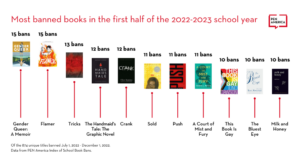New Report From PEN America: 28% Rise In School Book Bans Over First Half of 2022-23 School Year
From a PEN America Release:
The number of individual book bans across the country increased by 28 percent during the first half of the 2022-23 school year compared to the prior six months, January – June 2022, according to a new PEN America report. “Banned in the USA: State Laws Supercharge Book Suppression in Schools” documents how censorious legislation in states across the country has been a driving force behind new restrictions on access to books in public schools.
Since PEN America started tracking public school book bans in July 2021, the organization has recorded more than 4,000 instances of banned books through December 2022, affecting 2,253 unique titles. This includes 1,477 individual book bans affecting 874 unique titles during the first half of the 2022-23 school year.
In contrast with prior eras when book bans were initiated by parents or concerned citizens, nearly a third of the book bans this school year were the direct result of newly-enacted state laws in Florida, Utah, and Missouri. These laws have imposed stringent policies that schools must abide by when reviewing existing library collections. Under threat of punishment, they have spurred a chilling effect, leading to diminished access to literature for students.
These efforts to chill speech are part of the ongoing nationwide “Ed Scare” – a campaign to foment anxiety and anger with the ultimate goal of suppressing free expression in public education. As book bans escalate, coupled with the proliferation of legislative efforts to restrict teaching about topics such as race, gender, American history, and LGBTQ+ identities, the freedom to read, learn, and think continues to be undermined for students.
Among the report’s other major findings are:
- Texas and Florida continue to lead the country in book bans — 7 districts in Texas were responsible for 438 instances of individual book bans, and 13 districts in Florida were responsible for 357 bans.
- Of the 1,477 books banned this school year, 30 percent are about race, racism, or include characters of color, while 26 percent have LGBTQ+ characters or themes.
- An emerging feature during this school year have been “wholesale bans” –– the removal of untold numbers of books in classrooms and school libraries all at one time. This has been the result of teachers and librarians feeling pressured by new state laws to empty entire classroom collections.
- The most frequently banned books so far this school year are Gender Queer: A Memoir by Maia Kobabe (banned in 15 districts), Flamer by Mike Curato (banned in 15 districts), Tricks by Ellen Hopkins (banned in 13 districts), and The Handmaid’s Tale: The Graphic Novel by Margaret Atwood and Renee Nault (banned in 12 districts).
“The heavy-handed tactics of state legislators are mandating book bans, plain and simple,” said Suzanne Nossel, Chief Executive Officer of PEN America. “Some politicians like Florida Governor Ron DeSantis have tried to dismiss the rise in book bans as a ‘hoax.’ But their constituents and supporters are not fooled. The numbers don’t lie, and reveal a relentless crusade to constrict children’s freedom to read.”
According to Kasey Meehan, the Freedom to Read Program Director at PEN America and a lead author of the report, “This book ban movement erupted precisely as many schools had begun to diversify the literature they make available to young people. Now, those books are being ripped away from students who need access to diverse ideas, information, characters, and stories. They should not be deprived of the opportunity to see themselves reflected in literature and to learn from different perspectives.”
Another new trend highlighted in the report is the misapplication of labels such as “pornographic” or “indecent” by activists and politicians to justify the removal of books that do not remotely fit the well-established legal and colloquial definitions of pornography. Alarmist rhetoric about “porn in schools” has been a significant factor behind such mischaracterizations, which routinely conflate books that contain any sexual content or include LGBTQ+ characters with “pornography.”
This report expands on PEN America’s work on the spread of educational censorship in America’s schools, showing the rapid evolution and intensification of book-banning across the country since the September 2022 Banned in the USA report.
PEN America defines a school book ban as any action taken against a book based on its content and as a result of parent or community challenges, administrative decisions, or in response to direct or threatened action by lawmakers or other governmental officials, that leads to a previously accessible book being either completely removed from availability to students, or where access to a book is restricted or diminished.
See Also: The 11 Most Banned Books of the Start of the 2022-2023 School Year (via PEN America)
Filed under: Libraries, News, School Libraries
About Gary Price
Gary Price (gprice@gmail.com) is a librarian, writer, consultant, and frequent conference speaker based in the Washington D.C. metro area. He earned his MLIS degree from Wayne State University in Detroit. Price has won several awards including the SLA Innovations in Technology Award and Alumnus of the Year from the Wayne St. University Library and Information Science Program. From 2006-2009 he was Director of Online Information Services at Ask.com.



